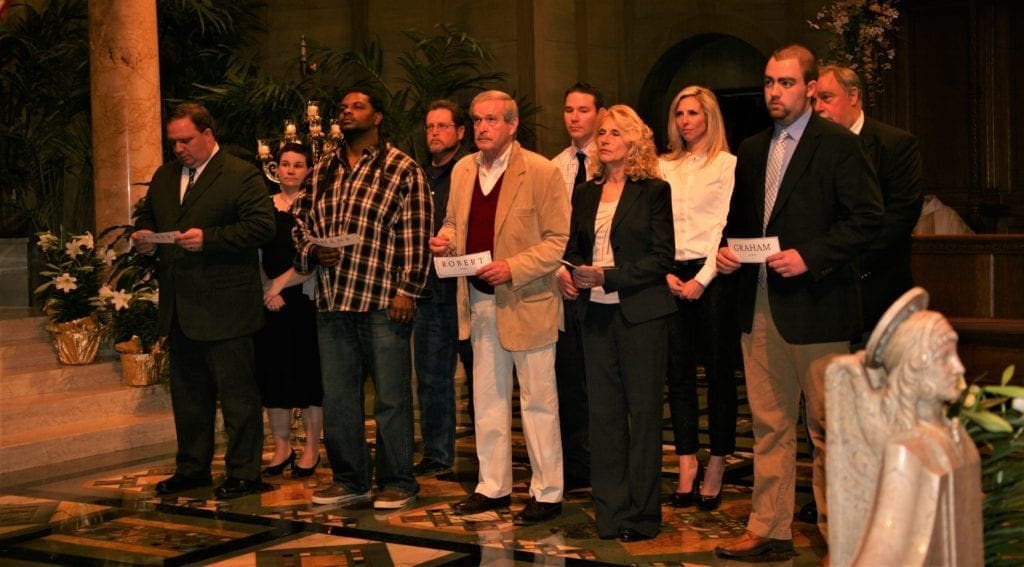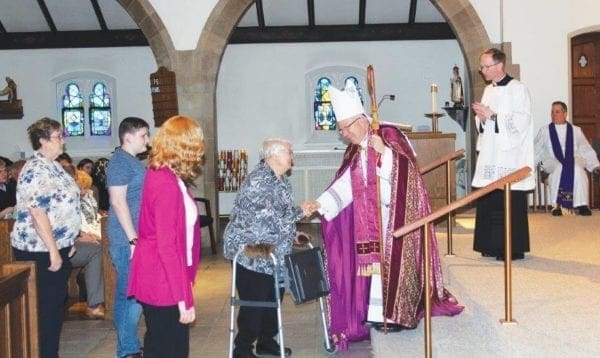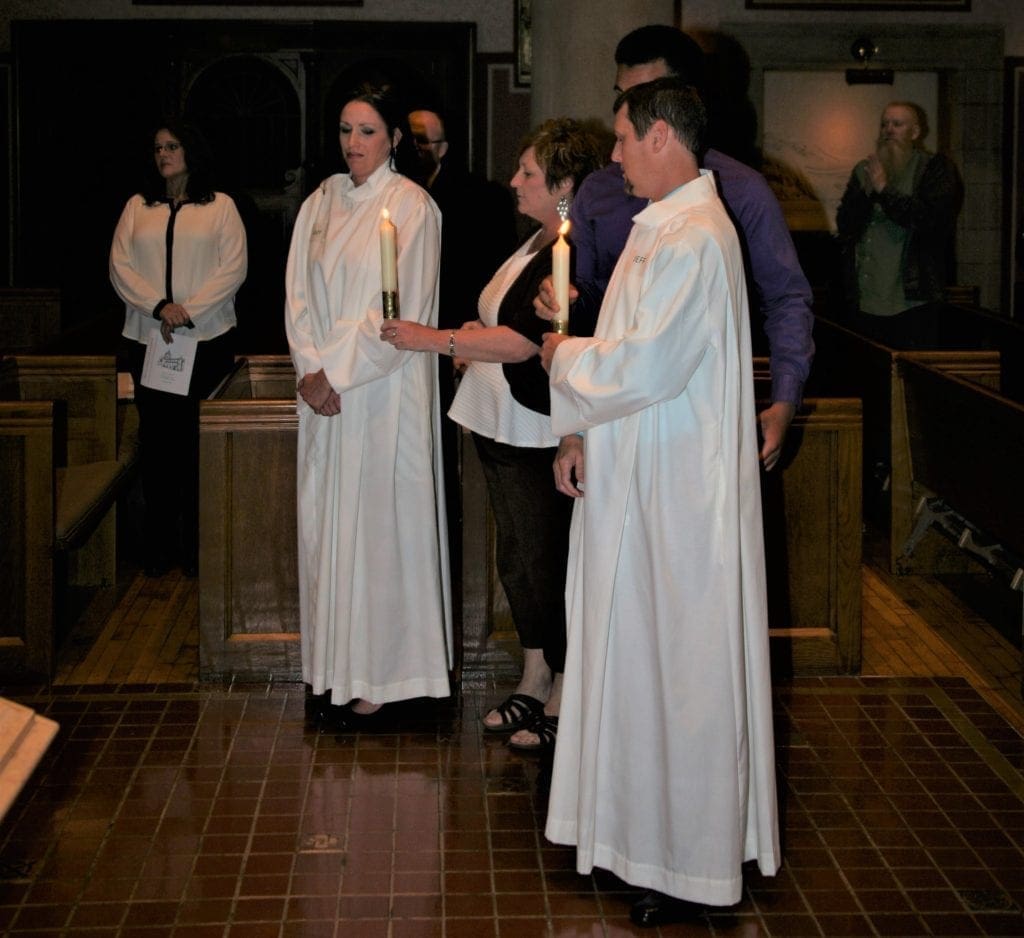The culmination of Holy Week, the most important period of the liturgical year in Christianity, will take place during the next 24 hours as Easter Vigil and Easter Sunday services will be offered across both the nation and the world.
Most of these will be done via digital telecast as the world observes social distancing rules whilst working through the coronavirus pandemic.
It is a time for Christians to reflect on the passion of Jesus Christ as well as to renew their own dedication to the Faith. Catholics also mark the occasion with the Sacrament of Initiation, when the Church officially welcomes new members into the faith during the Vigil Mass.
The Diocese of Steubenville is holding its Vigil Mass at the Holy Rosary Church in Steubenville, with the Most Rev. Jeffrey M. Monforton, bishop of the Diocese, celebrating the livestreamed event at 8 p.m. Those wishing to participate may do so here at the parish’s Facebook page. Easter Sunday mass will be livestreamed at 10 a.m. at the above link, while the Diocese of Wheeling-Charleston is livestreaming the Most Rev. Mark Brennan, bishop for the DWC, celebrating Easter Sunday at 11 a.m. here at the Diocese’s website.
On Hold
While both dioceses are broadcasting Easter services, the members of each parish’s RCIA class, or Rite of Christian Initiation for Adults, will not be able to complete his or her nearly year-long spiritual journey. It’s not canceled, but like many aspects of daily life, it’s put on indefinite hold.
“The Bishop sent out an email to all the priests in the diocese on March 24 stating that the sacraments of initiation have been delayed and that he can’t give a date when they will be celebrated because of the coronavirus pandemic,” said Dino Orsatti, director of Communications for the Diocese of Steubenville. “He said as authorities provide guidance to public health and safety, he will provide a date.”
The Diocese of Wheeling Charleston is taking the same approach. While traditionally, the Sacrament of Initiation takes place during the vigil mass, Canonically, this can be done outside of Holy Week at the bishop’s and each individual parish’s discretion.
“The Anointing of the Sick, Confession, Initiation, these are sacraments which have to be done in person,” said Tim Bishop, Director of Marketing and Communications for the DWC. “It’s not something that can be done over the phone. Plus, many want their family members to attend, which is going to be exceed the 5-to-10 people restriction local health officials set for gatherings. If we can’t do that as a Catholic community, bring them in into full communion with the church, we will wait until we can all be back in church together and have a grand celebration that the rite deserves.”

Members of the RCIA class are shown inside the Cathedral of St. Joseph in Wheeling 
What is RCIA?
Each year the RCIA process begins in September in local parishes with the inquiry stage. Meetings may be led by an associate priest, or a layperson well-schooled in the process. The unbaptized, along with baptized Christians from other denominations or even baptized Catholics who never completed their journey to full confirmation, attend usually weekly meetings to “inquire.”
They can ask questions relating to Catholic dogma, church teachings as they relate to things both in their lives and the world at large, etc. It’s the beginning phases of a spiritual journey and those interested are trying to discover if this is the path they should take. The Rite of Acceptance is celebrated at the local parish during Sunday mass, officially welcoming the interested members to the church. They are joined by their sponsors—usually family members or friends who are already Catholic, but it can be any practicing member of the faith willing to stand in and help on their spiritual journey.
Next is the Catechumenate stage of the process. Non-baptized are referred to as catechumens, an ancestral name from the early stages of the Church for someone being catechized or learning the catechism. This is where you learn the important parts of the Catholic faith and life. The baptized yet unconfirmed, Catholic or non-Catholic, are referred to as candidates.
Rite of Election
The second major ritual of the RCIA process ends the second stage as the Rite of Election occurs on the first Sunday of Lent as each of the catechumens and candidates signs their name in the Book of the Elect. In the diocese of Wheeling-Charleston, this Rite was held in three locations this Lenten season, the Cathedral of St. Joseph in Wheeling, along with Charleston and in the Eastern Panhandle to allow RCIA members from across the state to participate.
The final period of purification then begins, with the catechumens and candidates participating in three purifying rituals, or the Scrutinies as they are called, that help them finalize and prepare for their conversion.
The process then completes with the ceremony during the vigil mass, with the catechumens being baptized and the RCIA class members all experiencing their first communion and confirmation as a group in full view of the parish. A more detailed breakdown may be found here.

Adjusting on the Fly
Local parishes, like schools and businesses, got creative to keep the catechesis going. After all, while the Sacrament of Initiation must be given in person, preparation for and discussion about it does not.
“The really great thing our parishes were able to do, and the RCIA teachers were able to do, is to continue the classes and meetings online, using teleconferencing, or Zoom or whatever they found worked best,” said Tim Bishop, director of Marketing and Communications for the Diocese of Wheeling-Charleston. “They made sure to continue during the pandemic. The process hasn’t just stopped. We continue to pray for them and look forward to celebrating with them in the church when we are all able to get back together.”
As Bishop mentioned earlier, Initiation isn’t the only Sacrament affected by the social distancing guidelines.
The Sacrament of Confession has been altered temporarily to account for social distancing, but on an individual basis as well as the prospect of group absolution.
Pope Francis and the Vatican announced in mid-March that it was acceptable for Bishops to offer group absolution when necessary. Read more here.
Confession
On an individual basis, increased care has been considered for both the health and well-being of those giving, or receiving, the Rites. Special circumstances, i.e. imminent danger or death of a patient have also called for special circumstances, and Bishop noted the diocese has planned for that as well.
“I know they are taking extra precautions, but the priests are still Anointing the Sick and offering Confession,” Bishop said. “When the life of a patient is in danger, they will still be anointed. And we’ve found creative ways to celebrate Confession, whether it is calling and setting up an appointment, or some have confession through the screen door of the rectory or through a panel of glass at the parish.”
The novel coronavirus has made people from all walks of their life make major adjustments to their daily routines; the church isn’t any different. But those catechumens and candidates seeking oneness with the Catholic Church need only exercise patience and have a little faith, so to speak. Their time is coming.



